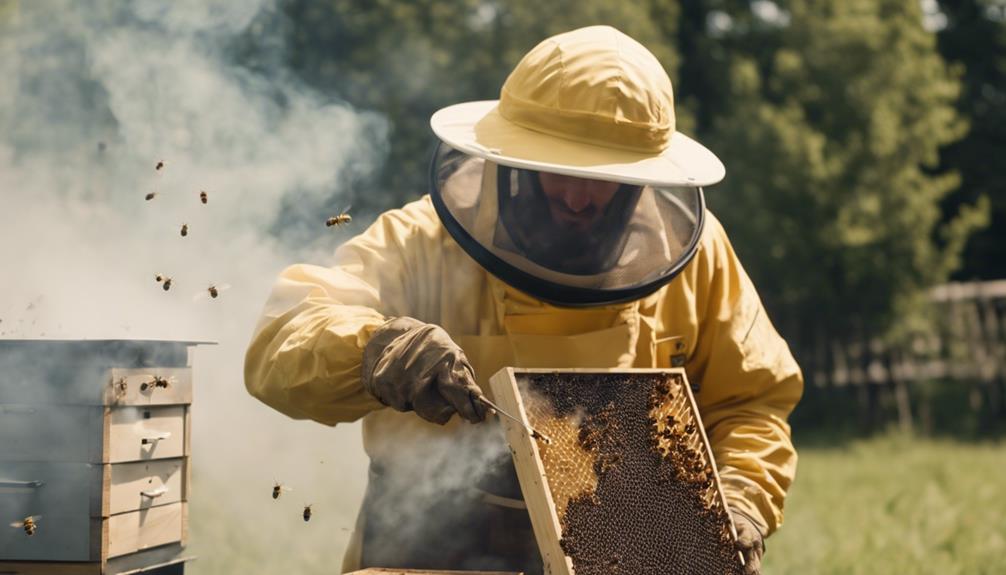
Using smoke in beekeeping is like having a secret weapon to keep things under control. It helps us keep the hives safe during inspections by calming the bees and dialing down the chances of defensive reactions. The smoke works its magic by masking those alarm pheromones that get the bees all riled up, giving us a smooth ride when managing the hives. It’s like pressing a ‘chill’ button for the bees without them even knowing it! Trust me; the bees and us beekeepers truly appreciate the benefits smoke brings to our buzzing buddies.
Main Points
- Acts as a soothing agent, calming bees during hive inspections.
- Reduces chances of stings by masking alarm pheromones.
- Triggers feeding response in bees, aiding hive management.
- Ensures minimal risk of stings, promoting beekeeper safety.
- Helps manage hives safely and efficiently, promoting hive health.
Importance of Smoke in Beekeeping
Using smoke in beekeeping is vital for maintaining hive safety and ease during inspections. When bees sense smoke, it triggers their innate response to wildfires, diverting their attention and reducing the likelihood of defensive reactions.
This is essential for beekeepers as it calms bees by masking their alarm pheromones, preventing them from becoming agitated during hive maintenance. The smoker, a tool that generates smoke, is a beekeeper’s best friend, ensuring that the process of collecting honey and managing the hive is smooth and safe.
Behavioral Effects of Smoke on Bees
Masking bees’ alarm pheromones, smoke plays a pivotal role in calming bees and reducing their defensive reactions during hive inspections. When smoke wafts through the hive, bees interpret it as a signal to prepare for possible migration, focusing on consuming honey rather than defending the hive. This disruption in communication and coordination among bees leads to a temporary state of calm, making it easier for beekeepers to work without triggering aggressive responses.
The cool smoke we use doesn’t harm the bees; it’s like pressing a pause button on their defensive instincts. Remember, the effects of smoke are short-lived, with bees regaining their pheromone sensitivity once the smoke dissipates. So, it’s a handy tool for keeping the peace during hive checks!
Mechanism of Smoke in Hive
After understanding how smoke calms bees and reduces their defensive reactions during hive inspections, it’s essential to investigate the specific mechanisms through which smoke achieves this effect in the hive.
- Smoke interferes with bees’ sense of smell, masking alarm pheromones that typically trigger defensive responses.
- Bees interpret the presence of smoke as a sign of a potential wildfire, prompting them to consume honey and diverting their focus from stinging.
- The use of smoke doesn’t harm bees but instead helps beekeepers manage hives safely and efficiently.
- By utilizing smoke as a tool, beekeepers can navigate hive maintenance with reduced disturbances, promoting both bee and beekeeper safety while maintaining the well-being of the colony.
Benefits of Using Smoke for Beekeepers
Utilizing smoke in beekeeping operations provides invaluable benefits for beekeepers by effectively guaranteeing bees and facilitating safe hive maintenance practices.
When beekeepers use smoke during hive inspections, it acts as a soothing agent, making bees less defensive and reducing the chances of stings. The smoke masks alarm pheromones, preventing bees from signaling danger to their colony members.
Additionally, the presence of smoke triggers a feeding response in bees, causing them to gorge on honey. This not only distracts them but also makes them less likely to focus on beekeepers, guaranteeing minimal risk of stings during hive maintenance.
Ultimately, smoke is a key tool for beekeepers to guarantee hive health without causing harm to the bees, making it an indispensable part of beekeeping practices.
Best Practices for Smoking Hives
What’re the key considerations for effectively smoking hives to guarantee beekeeper safety and hive maintenance success? When it pertains to smoking hives, there are several best practices that can help guarantee a positive experience for both beekeepers and bees:
- Use dry, natural materials for peak smoke production.
- Keep the smoker fire smoldering to avoid flames that could harm the bees.
- Direct the smoke gently towards the hive entrance to allow it to disperse effectively.
- Monitor bee behavior during hive inspections to gauge the calming effect of the smoke.
Hello! My name is Noel Calvin. I graduated from UCLA and now work as a writer at Launch Ninjas. I write blog posts that inspire and guide our readers in their entrepreneurial pursuits. I live in Pleasantville, NJ, with a peaceful yet lively atmosphere that inspires me.
Writing stories is more than just a job for me. It allows me to share my observations and satisfy my curiosity about the world. I combine my analytical skills with creative enthusiasm to delve into technology trends and startup stories. But my life isn’t limited to screens and keyboards. I value loyalty, passion, and a touch of old-fashioned charm, which I infuse into every narrative I create.
I love spending time in my garage, jamming with my band when I’m not writing. Playing the guitar and singing bring me immense joy. I also enjoy capturing ordinary and extraordinary moments through my camera lens and exploring new culinary adventures that excite my taste buds. I’m always seeking new experiences.
My family is very important to me. Joyful Sunday brunches filled with laughter and intense board game nights keep me grounded, reminding me of life’s simple pleasures.
In my world, every moment is an opportunity for discovery. Every discovery is a story worth sharing, whether a heartfelt moment at home or the pulse of technological innovations. Join me as I navigate through life, one blog post, one guitar strum, and one heartwarming family dinner at a time.
